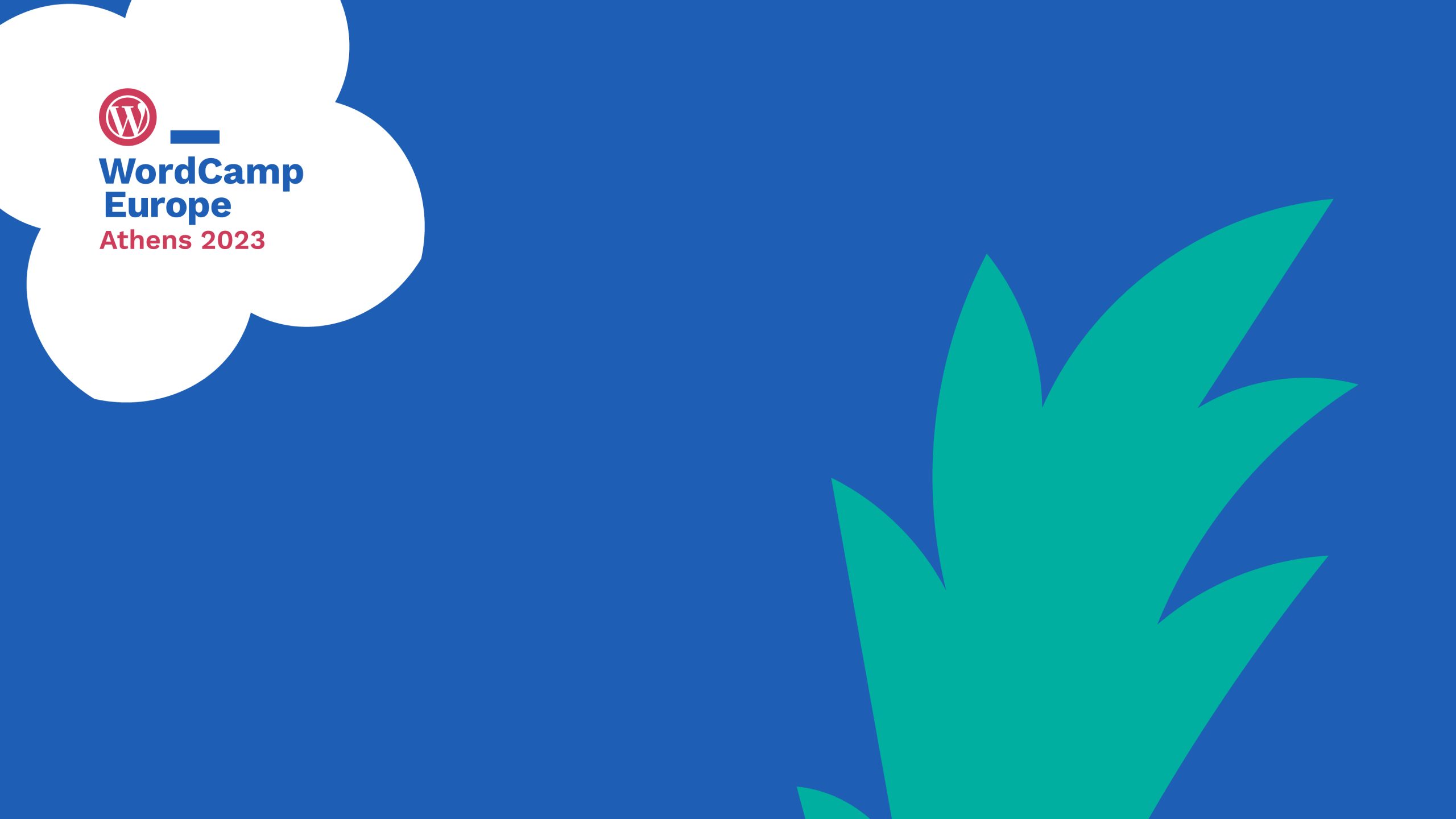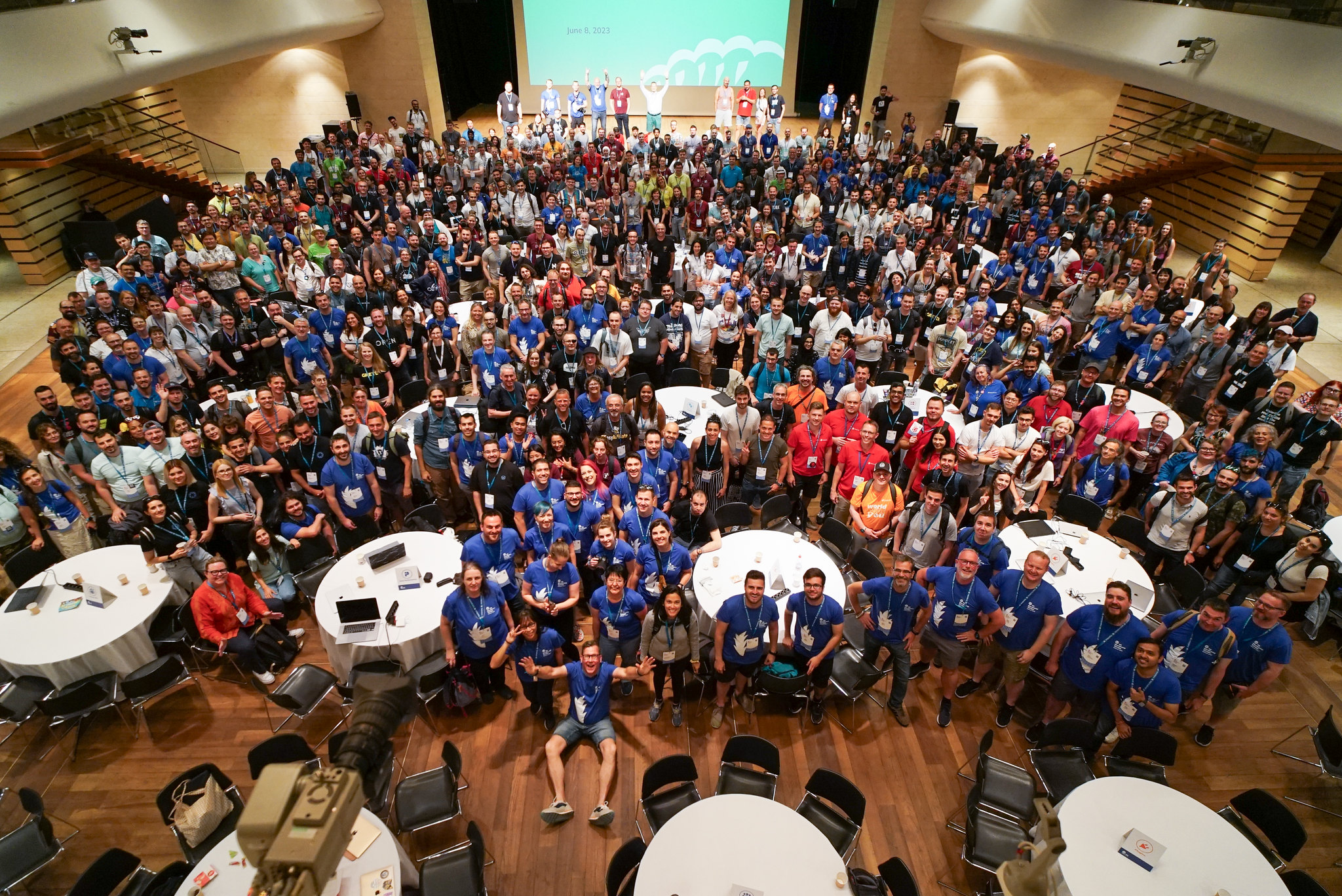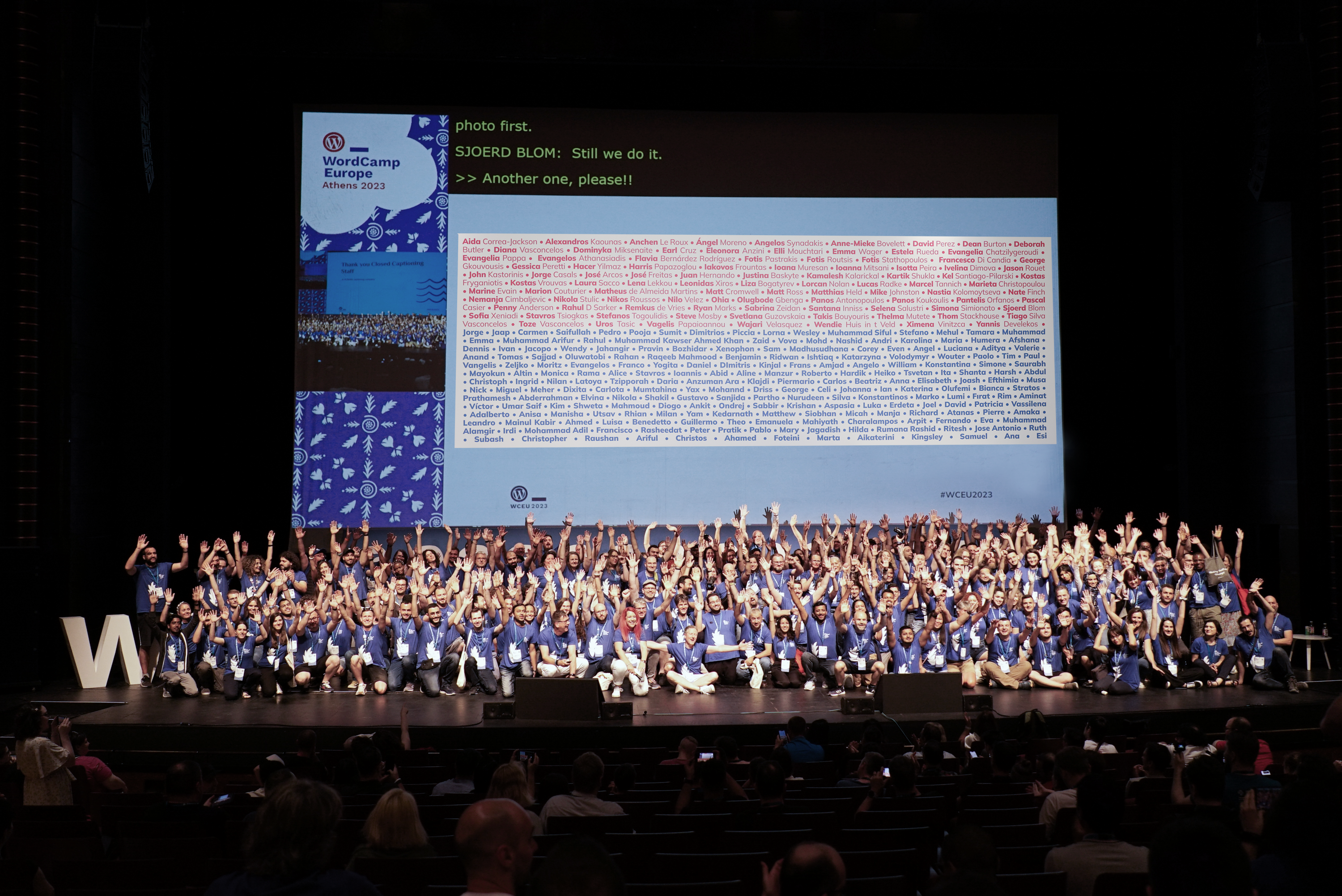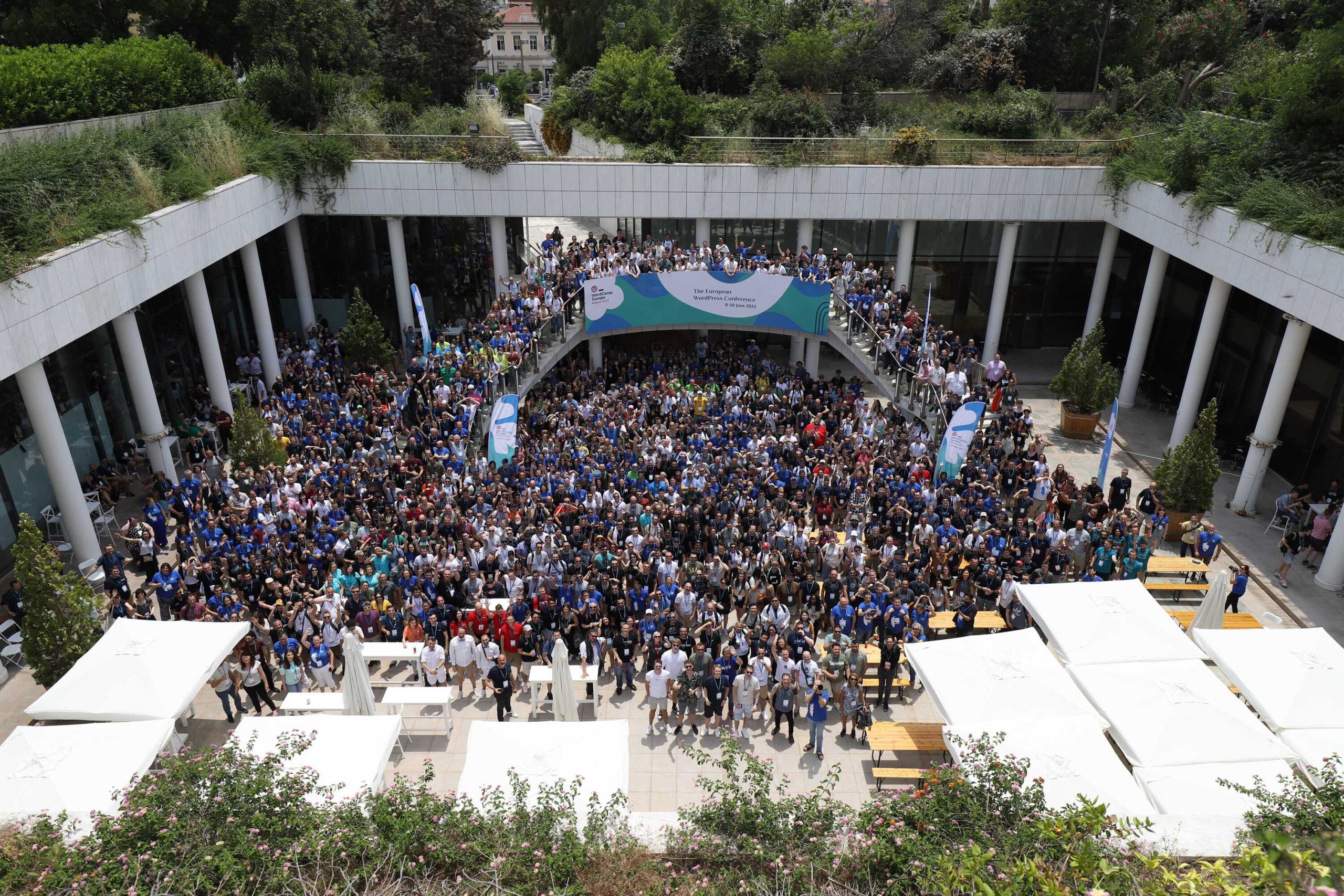Transparency is important at WordCamp Europe, we want everyone who puts their trust in us to understand our selection processes and efforts in order to create a high quality equitable event. Throughout the lifecycle of each WordCamp Europe event a number of selection processes take place, each designed to make sure that outcomes are reached that deliver what’s required (to achieve a particular goal), but also making sure that various criteria are met.
This article has been created to provide a clearer view of those selection processes, the rationale for them and how they were conducted for WordCamp Europe 2023.
Organiser Selection
Understandably, this is the first part of a WordCamp lifecycle; inviting people to apply to be an Organiser for the next edition of a WordCamp. In this year’s case, applications opened at the end of the talks in Porto on Saturday 4 June 2022 and remained open until late summer.
Once the ‘Call for Organisers’ – in which the application asks people to state what team they feel that they would be a good fit for and work within, as well as agreeing to adhere to the Code of Conduct – was closed, all submitted applications were sorted to find those who had expressed an interest in leading a team. Ideally a Team Lead will have previous experience as a WordCamp Organiser; this is our ‘succession planning’, ensuring that knowledge and experience can be retained from year to year and also passed on. We use Airtable to collate all submissions, which enables us to assess each application.
Each application was reviewed by this year’s Global Leads and they shortlisted those who they felt have the right skills (based on what was written in their application) and experience. The Global Leads try to keep gender parity high whilst also selecting people from all available European WordPress communities, so that the event is governed with polyphony.
Once Team Leads were chosen, they were tasked with choosing their teams to work with them on delivering the next edition of WordCamp Europe.
Each team has a distinct set of skills required to achieve their specific remit within WordCamp, so each Team Lead reviewed applications where their team had been highlighted by the applicant as one that they would like to work within. Team Leads shortlisted a mix of newcomers to the Organising Team and those who’ve been involved before – again, to effectively create succession plans. Whether new to WordCamp or not, each application was reviewed and only those whose application met the needs of that team were shortlisted.
As an example, the Communications team requires a number of people whose primary language is British English (as this is the chosen language of WordCamp Europe), but equally selects applicants where English may not be their native tongue, so roles within the team are geared around this.
After shortlisting was complete, each applicant was then verified for suitability by WordCamp Central; it is their job to ensure that everyone that is likely to represent the WordPress brand hasn’t publicly said, posted or in any other way published anything that could be detrimental to the brand, or cause offence, hurt or otherwise become a distraction from the event itself.
During the selection process we don’t have anything that resembles a “positive discrimination” policy, whereby we choose people based on their race, colour, background, gender, sexual identity, or any other attribute; we solely chose people based on their stated experience and enthusiasm to be part of the team.
In an effort to keep new, fresh, ideas coming to WordCamp Europe, Team Leads are limited to a maximum 2 year term (although some only serve 1 year). Acknowledging that diversity within the Organising team is important, we reach out to community groups and members before and during the application process, encouraging people to apply where we have historically seen underrepresentation.
Media Partners
Each edition of WordCamp Europe teams up with media organisations around the world to help share the news and stories coming out of the event. These may be websites, blogs, podcasts or any other format. Each year a ‘Call for Media Partners’ is announced, inviting applications from organisations (or even just casual bloggers who have an avid interest in WordPress) who would like to partner with us.
The application form asked for a wealth of information which is used in the selection process. This year’s process requested details such as audience location (in addition to volumes), language(s) used, frequency of publication and – importantly – how they planned to cover the event.
After applications closed at the end of March, our PR team began sifting through the applications. This year, thanks to the experience within the team that was selected, we used a Six Sigma-derived Cause & Effect scoring matrix; as we felt that this would help ensure an unbiased approach and reduce any chance of subjectivity influencing decisions.
| Category | Weighting | Score = 0 | Score = 1 | Score = 3 | Score = 9 |
|---|---|---|---|---|---|
| WordPress specific | 1 | Not tech-oriented | Broad coverage of tech fields | Broad coverage of web | WordPress focused |
| Audience geography | 2 | Regional / Local | Single country | Multiple countries | Multiple countries / continents |
| Language | 3 | English only | English plus others | Non-English only | |
| Publication frequency | 4 | Monthly | Weekly | Daily / More than once a week | Multiple times a day |
| Previous year participant | 5 | No | 1-2 years | 3-4 years | 5-6 years |
| Media type | 6 | 1 channel | 2-3 channels | 4-5 channels | 6-8 channels |
| Size of audience | 7 | No answer or <1k | 1k to 5k | 5k to 25k | >25k |
| Publication quality | 8 | Inconsistent / basic | Erratic design / content | Good. Design or content could be better | Very high quality / professional |
| Quality of coverage plan | 9 | No detail provided | Basic description, no detail | High-level plan | Detailed plan |
| Supports special audiences | 10 | Mainstream audience only | Broad coverage, no targeting | Broad coverage, some emphasis on specific audiences | Targets small / emerging communities |
Each applicant was scored against this matrix, receiving the stated score based on their response to each category question, with scores weighted as shown in the 2nd column. So a more detailed coverage plan aimed at audiences who are new to WordPress would increase a score over an application that gave vague details of their coverage plan and no audience statistics.
We have a finite number of Media Partner openings each year, as there is a financial impact – from the loss of ticket revenue and additional catering costs. So, unfortunately, we cannot afford to accept every application.
We then invited those applicants with the highest score to join us as a Media Partner – some accepted, some declined, which meant we could offer a place to the highest-scoring applicants who were outside of the initial available slots.
Speakers
One of the, if not the biggest, draws to WordCamp Europe are the talks and workshops that take place, where speakers share their knowledge, experience and everything in between. WordCamp Europe wouldn’t be the same without them.
How do you select speakers to present at an event without having unconscious bias affect the results? That’s the challenge that presents itself to the Content Team every year. But with a logical process in place, they manage to achieve it.
Hundreds of applications are received every year. Hundreds! And they all need to be evaluated manually by a team of volunteers in the Content Team. But that evaluation is completed after any personally identifying information, such as names, websites, social media links, etc has been removed from the review data. Scores are given to each application based on the following criteria –
- [Topic] Is this a good topic for a flagship WordCamp?
- [Topic] Are the take-aways clear, compelling, achievable?
- [Audience] Is it clear who is the intended audience?
- [Speaker] Can the speaker communicate properly in writing?
- [Speak] Did they put effort into making their talk ‘fit’ the format of the event?
- [Total Score] Sum of 1-5 questions score
Once the first review (and scores are given) is completed, the personal information is then added back and a bigger group of people review everything from the application; watching videos (if submitted), look at websites, social media links, etc. This ensures that the wider team reviews the whole application, but with scores added from the initial assessment.
Once our 2nd review was complete it became clear that our panel of speakers – at that point – would not have been representative of the WordPress community. To rectify this we added a 3rd track, which added capacity for more talks and we then actively invited applicants from so-far under represented groups to take part.
The goal of the Content Team is to choose talks (not necessarily speakers!) that provide a broad range of topics, balancing the needs of newcomers and the more experienced, maintain variety and also endeavour to pick a diverse group of speakers.
Sponsors
Last, but certainly by no means least, we come to the selection process for our Sponsors. It’s fair to say that without Sponsors there wouldn’t be the WordCamp Europe that you know today. Ticket prices would be significantly higher than the €50 we charge. Even our Micro-sponsor tickets of €150 would be vastly more expensive.
You probably think we accept every application we receive – or at least that we should and be grateful for their cash. But much like with our Organiser ‘vetting’, we have to ensure that proposed Sponsors are a “right fit” with WordCamp Europe.
Should an organisation apply to be a Sponsor and during our checks we found that they had taken part in or promoted activities or language that aren’t compatible with our Code of Conduct then we would simply decline their application. That’s just one example.
Other checks that we go through surround the products or services offered; are they incompatible with the event – such as alcohol, tobacco or gambling. Being a previous sponsor helps with our decision, naturally, but it isn’t a prerequisite. Being a provider of Open Source products is something we value highly, however that’s not to say it is mandatory; banks, agencies, hotels (to name just a few) regularly collaborate with WordCamps, yet don’t – by their nature – provide Open Source products or services.
You can learn more about what’s expected – and what won’t be – from Sponsors in the Organiser Handbook.
Final thoughts about the 2023 processes
In 2022 we achieved a fairly diverse Organising Team and set of Speakers relatively easily, and somewhat organically. This year we tried to focus more on the subject matter of talks. However, after the first review of speaker applications was completed and applicants’ personal information had been added back, it became clear that we were going to be heavily skewed away from representing the diverse WordPress community. And certainly not what a flagship WordCamp event should strive to achieve.
At this point, our Content Team Lead chose to step down which led to us missing planned milestones while we sought to find a new Team Lead. The major milestone we missed was announcing our Speakers and their talks. This obviously causes concern by applicants, as they don’t know whether to book travel or not. But this also impacts ticket sales – often if people don’t know who will be speaking, they won’t buy a ticket.
Two of our Content Team stepped up to co-lead the team, working quickly to bring us back on track; despite the obvious negative sentiment that was circulating publicly.
Ticket sales are important, without them we cannot create the WordCamp Europe experience that you expect and deserve. So we chose to start announcing Speakers that we had confirmed whilst continuing to run the process in the background. Doing so created the appearance of a white male-heavy event. In hindsight this was a mistake to begin announcing early.
Now that we have completed the Speaker selection process and confirmed the full schedule we believe – and hope that you do too – that we have a wide, diverse and representative lineup for this year’s event.
WordCamp Europe is an iterative event; each year learns from the last and 2024 will be no different. We cannot take for granted that achieving diversity one year guarantees it the next. As a flagship WordCamp event we may need to positively discriminate to achieve gender parity, or fair representation of communities. We need to be better prepared for disruptions, such as Organisers leaving.




